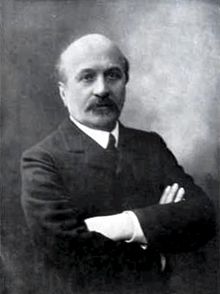Léopold Lacour
Léopold Lacour | |
|---|---|
 | |
| Born | February 9, 1854 |
| Died | 1939 (aged 85) |
| Nationality | French |
| Occupation(s) | Teacher, writer |
| Known for | Historical view of feminism |
Léopold Lacour (9 February 1854 – 1939) was an influential French teacher, sociologist, writer and feminist.
Biography
Léopold Lacour was born in 1854.
He attended the
Léopold Lacour assisted with the 1896 International Feminist Congress in Paris, presided over by Marie Bonnevial, which discussed coeducation. There was much argument and little agreement.[3] Marie Léopold-Lacour gave a presentation that outlined the state of mixed schools in Europe and gave a response to the opponents of coeducation. Many of the elements of the presentation were taken from the work of Léopold Lacour. As the first mixed school in France, the Prévost orphanage of Cempuis received much attention.[4] Lacour and Pauline Kergomard were able to obtain agreement on the final resolution, in favor of changing to a coeducational system in all countries.[5]
Lacour gave well-attended talks on the fashionable subject of feminism at the
Léopold Lacour died in 1939 at the age of 85. His remains are in Montparnasse cemetery.[9]
Views
Léopold Lacour was a socialist and a feminist, believing that women deserved and must strive for a full and rich life without restrictions.[1] He preferred the word "humanism" to "feminism", considering that it better conveyed the idea of sexual harmony.[7] He believed in equality of the sexes, in the sense of equal rights.[10] Women in the late 19th century had to contend with the misogynist views of writers such as Alexandre Dumas, Émile Zola and Octave Mirbeau.[11] These authors thought Lacour and others sympathetic to feminism such as
Klejman and Rochefort said that while Eliska Vincent created le féminisme historique, Léopold Lacour is without a doubt the first to undertake an historian's examination of feminism."[13]
Bibliography
Léopold Lacour was a prolific author. Some books:
- Lacour, Léopold (1880). Trois théâtres: Émile Auger, Alexandre Dumas, fils, Victorien Sardou. Calmann Lévy. Retrieved 2013-09-14.
- Lacour, Léopold (1883). Gaulois et parisiens: Eugène Labiche, Henry Meilhac et Ludovic Halévy, Edmond Gondinet. Calmann-Lévy. Retrieved 2013-09-14.
- Lacour, Léopold (1896). Humanisme Intégral: Le Duel Des Sexes. la Cité Future. BiblioLife. ISBN 978-1-145-14989-2. Retrieved 2013-09-14.
- Lacour, Léopold (1898). Conférences faites aux matinées classiques du théâtre national de l'Odéon et du théâtre de la République par Mme Dieulafoy, MM. Francisque Sarcey, Jules Lemaître et al... Paris: A. Crémieux.
- Lacour, Léopold (1900). Les Origines du féminisme contemporain: Trois femmes de la révolution: Olympe de Gouges, Théroigne de Méricourt, Rose Lacombe. Plon-Nourrit. Retrieved 2013-09-14.
- Lacour, Léopold (1901). La Femme dans le théâtre du XIXe siècle. Retrieved 2013-09-14.
- Lacour, Léopold (1909). La Révolution française et ses détracteurs d'aujourd'hui: Préface de A. Aulard. Bibliothèque des Réformes sociales. Retrieved 2013-09-14.
- Lacour, Léopold (1909). La France moderne, problèmes politiques et sociaux. Retrieved 2013-09-14.
- Lacour, Léopold; Richardin, Edmond (1910). Les Femmes Illustres. (Collection Publiée Sous la Direction de M. Edmond Richardin ... Et M. Léopold Lacour.). Retrieved 2013-09-14.
- Lacour, Léopold (1910). Jules Renard – Ses contes. Ses romans, ses comédies. Retrieved 2013-09-14.
- Lacour, Léopold (1914). Les maîtresses & la femme de Molière. Éditions d'art et de littérature. Retrieved 2013-09-14.
- Toledo, Vitalis de; Lacour, Léopold (1915). L'Habit de guerre ; Pièce en 1 acte. Préf. de Léopold Lacour. Sansot. Retrieved 2013-09-14.
- Geffroy, Gustave; Lacour, Léopold; Lumet, Louis (1919). La France héroïque et ses alliés. Larousse. Retrieved 2013-09-14.
- Lacour, Léopold (1921). Les Premières Actrices Françaises, Etc. [With Plates.]. Retrieved 2013-09-14.
- Lacour, Léopold (1924). Le Théâtre en Suède. Retrieved 2013-09-14.
- Lacour, Léopold (1928). Molière acteur. F. Alcan. Retrieved 2013-09-14.
- Lacour, Léopold (1938). Une Longue Vie, Etc. [Reminiscences.]. Retrieved 2013-09-14.
- Lacour, Léopold (September 2010). Trois Theatres: Emile Augier, Alexandre Dumas Fils, Victorien Sardou (1880). Kessinger Publishing. ISBN 978-1-165-15607-8. Retrieved 2013-09-14.
References
Citations
- ^ a b Waelti-Walters & Hause 1994, p. 197.
- ^ Robertson 1974, p. 97.
- ^ Karnaouch 2005, p. 20.
- ^ Karnaouch 2005, p. 21.
- ^ Karnaouch 2003, p. 29.
- ^ Paletschek & Pietrow-Ennker 2004, p. 92.
- ^ a b Fauré 2013, p. 764.
- ^ Dixson 1999, p. 206.
- ^ Lacour: Gravestone Photographic Resource.
- ^ Cova 2011, p. 217.
- ^ McLaren 2008, p. 31.
- ^ McLaren 2008, p. 32.
- ^ Waelti-Walters & Hause 1994, p. 200.
Sources
- Cova, Anne (2011-04-01). Féminismes et néo-malthusianismes sous la IIIe République : "La liberté de la maternité". Editions L'Harmattan. ISBN 978-2-296-46001-0. Retrieved 2013-09-15.
- ISBN 978-0-86840-737-1. Retrieved 2013-09-15.
- Fauré, Christine (2013-07-04). Political and Historical Encyclopaedia of Women. Taylor & Francis. ISBN 978-1-135-45690-0. Retrieved 2013-09-15.
- Karnaouch, Denise (2003). "Féminisme et coéducation en Europe avant 1914". Coéducation et mixité (in French). Presses Univ. du Mirail. ISBN 978-2-85816-706-7. Retrieved 2013-09-15.
- Karnaouch, Denise (2005). "Féminisme et laïcité 1848-1914" (PDF). Les Archives du Féminisme (in French) (9). Archived from the original (PDF) on 2008-11-13. Retrieved 2013-09-15.
- "Lacour". Gravestone Photographic Resource. Retrieved 2013-09-15.
- McLaren, Angus (2008-04-15). The Trials of Masculinity: Policing Sexual Boundaries, 1870-1930. University of Chicago Press. ISBN 978-0-226-50069-0. Retrieved 2013-09-15.
- Paletschek, Sylvia; Pietrow-Ennker, Bianka (2004-01-01). Women's Emancipation Movements in the Nineteenth Century: A European Perspective. Stanford University Press. ISBN 978-0-8047-6707-1. Retrieved 2013-09-15.
- Robertson, Dougal (1974). Survive the Savage Sea. Ardent Media. ISBN 978-0-8161-6235-2. Retrieved 2013-09-15.
- Waelti-Walters, Jennifer R.; Hause, Steven C. (1994). Feminisms of the Belle Epoque: A Historical and Literary Anthology. U of Nebraska Press. p. 197. ISBN 978-0-8032-9748-7. Retrieved 2013-09-14.
